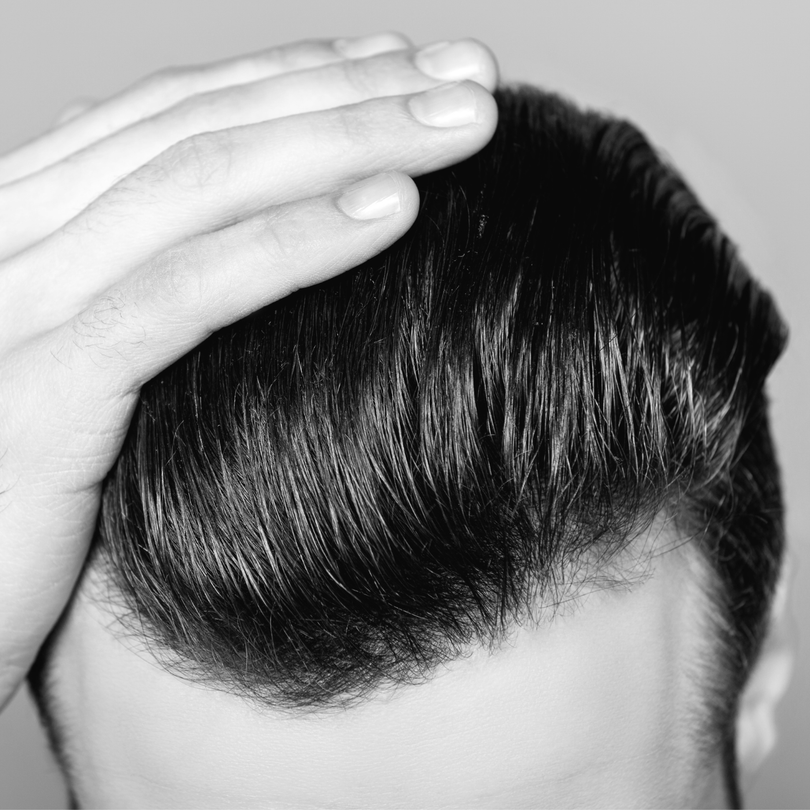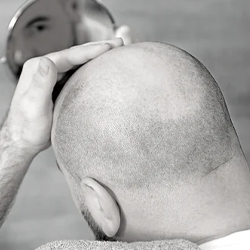dr Robert Jones on hair loss
In general, according to Dr Robert Jones, there are three different causes:
Hereditary hair loss (androgenetic alopecia): A genetic inheritance of “a hypersensitivity of the hair follicles to the steroid hormone dihydrotestosterone (DHT)” (source: Wikipedia). In the case of alopecia, the hair follicles remain, but the hair itself withers away to barely visible hairs. The hair on the neck and sides is not affected by hypersensitivity.
Hair loss as a side effect of medication, undernourishment or malnutrition, hypothyroidism, allergies and illnesses: in fewer cases, the cause of the visible thinning of the main hair is illness-related.
Hair loss due to pressure on the hair roots: Alopecia mechanis, i.e. the thinning of the main hair due to pressure, sometimes occurs when a head covering, e.g. a helmet or a cap, is constantly worn. But this is very rarely the case. More commonly, this type of hair loss occurs from braiding cornrows or attaching hair pieces such as extensions.
Hair loss can have several causes. Poor nutrition and sensitivities or allergies to ingredients in care and styling products that are unknown to the person concerned are certainly not beneficial. However, persistent alopecia is not to be found in these causes or in causes such as stress.
Hair Loss in Women Watch the Video: Dr Robert Jones is an internationally recognized Canadian hair transplant physician. Among his patients, he counts not only TV stars but rather challenging cases of people with strokes of fate such as fire victims. He takes women with thinning hair particularly to heart, as it puts a particularly heavy strain on them psychologically. He was therefore invited to the Canadian TV show "Steven and Chris Show".
If it was a bit quick with the subtitles, I have the text ready for you here: << dr Jones on the Canadian lifestyle show “Steven and Chris Show” on the subject of hair loss in women >> Host: "Welcome back! Hair loss is usually associated with men, although half of all women over the age of fifty experience some form of hair loss. Our next guest is here to give advice. Welcome Dr. Robert Jones." Moderator: "How serious is this problem for women?" dr Jones: "Well, I'm very happy to be invited here. This topic is very important to me. I see women in my office in tears every day because they are losing their hair. It's something most people go to their GP for and often just get brushed off of, more or less. Hair loss in women is usually associated with illness or old age. Men, on the other hand, often get off lightly with a little thinning hair, but the situation is dramatic for women. Then it gets very emotional. But 90% of the time we can do something about it ourselves and that's why it's nice to be here and to be able to say that there is something." Host: "Yes. There are certain causes, right?” dr Jones: “By far the most common cause is heredity. You know, 80-90% of the women I see have hereditary hair loss. Other causes include pregnancy, certain medications, birth control pills and, with its increasing popularity, hair extensions. Also, black women quite often wear their hair in tight braids and lose hair as a result.” Moderator: "You can see on models or on television that many women wear extensions..." dr Jones: "It leads to permanent hair loss." dr Jones: "This is a case of traction alopecia in a woman who wore tight braids. It's more common than you might think, especially with hair extensions. Hair extensions thin all hair because it puts pressure on the entire scalp.” dr Jones: "What we're seeing here is typical female hair loss. When women lose hair, they do it differently than men. Women mostly keep the hairline. It is generally thinning on the top of the head - mostly at the top of the head and in the crown area. While men mainly lose hair in the front and in the crown area. So there is a difference in the pattern of hair loss in women - called the "Ludwig pattern". Women lose hair not only on the top of their head in general, but also hair on the back. Moderator: "What are we seeing here?" dr Jones: That's the Ludwig scheme. As you can see, hair loss progresses from the crown of the head and usually extends to the back of the head as well. But as I said, the hairline is usually preserved. Moderator: "Let's talk about this...obviously it's not a big deal for men, but for women..." dr Jones: “Dr: It's a big problem for men too. But, yes, for women an even bigger one.” Moderator: "Yes, definitely a bigger one and it seems that communication about it is not so open. Women don't seem to want to talk about it that openly." dr Jones: "Well, it's just uncomfortable and as I said they go to the family doctor first and the doctor is used to taking care of more serious diseases and that's why the women tend to be turned off. But with most women, there really is something you can do. There are treatments. Moderator: "Exactly. Let's go through a few.” dr Jones: “There are basically two paths for women. Medical causes need to be assessed first as these are usually reversible and once that is done we usually try Minoxidil or Rogaine – 2% or 6% via their doctor.” Moderator: "How's that Rogaine? Does it really grow hair?” dr Jones: Yes, exactly. (Joking) I'm just telling women to be careful not to smear it on their face.” Moderator: "So it really encourages growth." Dr Jones: Yes, really. Well, on the other hand, there are cosmetic options. There are basically two of them. I have a few people who do great things with hairpieces. There really shouldn't be any embarrassment wearing something like this if it makes you look good and make you feel good. On the other hand, there are cosmetic hair thickeners – simply fine synthetic hair fibers that are attached to your existing hair by sprinkling them on.” Moderator: "I want to see that!" Dr Jones: "Sure. I'll show you on myself. I've had a hair transplant but it's still a little thin. You just shake it a little over the spots almost like out of a pepper shaker. My friends sometimes ask me how I came up with the idea of developing a hair shaker.” Host: "It's like powder. That is interesting." dr Jones: "It's really good for women because it doesn't work so well on the hairline - better on the top of the head." Host: "What does it matter? What happens exactly? dr Jones: "They're synthetic hair fibers that attach themselves to the hair, making it appear fuller. It's an impressive product, especially for women.” Moderator: "Does it come in different colors?" dr Jones: "Yes, you choose a suitable color for your hair. (...) If you look at actors, they sometimes have more hair, sometimes less. I think there are over a million users. Moderator: "And the last option is a little more drastic - a hair transplant." dr Jones: “Dr: Hair transplants happen to about 1 in 20, 30 women. You need good donor hair and a rather small area to be treated. But this is really a last resort.” Moderator: “Thank you Dr Jones. Before we go, here is the hair thickening system: Instant Hair”













